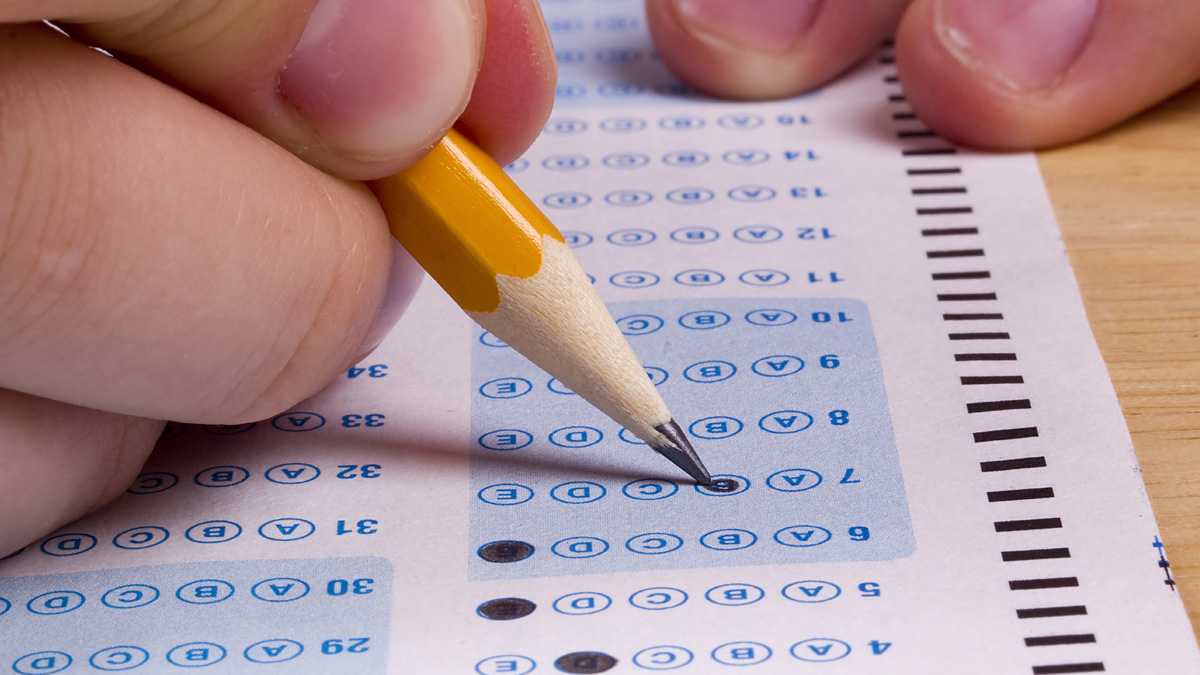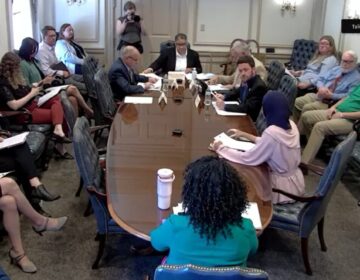Delaware approves new accountability system despite objections
 Student filling out answers to a test via ShutterStock) " title="l_education16x9-1" width="1" height="1"/>
Student filling out answers to a test via ShutterStock) " title="l_education16x9-1" width="1" height="1"/>
(Student filling out answers to a test via ShutterStock)
Delaware approved a new formula for evaluating schools Thurday, despite a provision that some say will discourage students from opting out of standardized tests.
The Delaware School Success Framework (DSSF), as the forumla is called, will be the basis for new school report cards slated for release later this year. The report cards will rank schools based on their academic performance and school climate. Those rankings will also be used to group schools in a number of tiers–some which confer positive recognition and others which can trigger state intervention. The report cards are also intended as a resource for parents so they can determine the quality of various public schools.
Debate erupted recently over a small-but-symbolically significant clause embedded in the framework. It mandates that Delaware factor in a school’s participation rate on standardized tests when calculating academic achievement scores. More specifically, schools where less than 95 percent of students participate in the statewide assessment will be penalized while those above the 95 percent threshold will receive a bump. Under the provision, the state will multiply a school’s participation rate by its academic achievement rating to create an overall score.
That provision struck a nerve with proponents of the parent opt out movement, who believe the clause is intend to penalize schools where large swaths of students refuse to take the statewide standardized test. In recent years, an increasing number of parents have pulled their children from standardized tests as a means of protesting over-testing in schools.
Adding to the conflict, a working group of educators, administrators, and advocates recommended the state not include the so-called “multiplier” clause in the new report card system. The Accountability Framework Working Group, which helped craft the new report cards, suggested the state require schools with poor participation rates to craft action plans. The group balked, however, at a numerical penalty for schools based on participation rates.
The state’s new Secretary of Education, Steven Godowsky, overrode the group’s recommendation despite strenuous objections from activists. State officials say the multiplier penalty exists to discourage schools from gaming the system by purposefully excluding low-performing students.
“It has happened and we have to continue to be alert to the issue,” said Godowsky at a special Tuesday convening of the working group.
At that same meeting, activists and legislators decried Godowsky’s decision.
“We’re punishing [schools] over something they have no control over,” said State Representative Kim Williams, D-Wilmington.
Members of the working group declined to change their decision. They argued that compelling schools to craft a plan was a steep enough consequence for low particpation rates.
State officials pointed out on Thursday that the penalty imposed by the new framework is mild. If the provision had been in place for test scores from the past school year, only one school would have seen its overall rating change. And in that one case, the school’s rating would have actually improved.
That’s in part because opt-out rates in Delaware have been low compared to states such as New York, where, in some districts, more than half of students refused to participate in a recent standardized assessment. In Delaware, no district saw less than 90 percent of students refuse the most recent assessment.
The State Board of Education approved the new accoutability framework Thursday, with four members voting yes, two absent, and one abstaining.
The new report cards will be released later this year. This year’s version will not include the multiplier provision for participations rates. That clause will go into effect next year.
The DSSF replaces Adequate Yearly Progress, an accountability tool that emerged out of the No Child Left Behind Act. The federal government has been pushing states to create new accountability frameworks.
Delaware’s will have two main categories. The first deals with academic achievement and is broken down into seven parts. The multiplier clause will be applied to just one of those categories–the one that measures student proficiency in math, English, science, and social studies. There are also categories that measure student growth, attendance, the number of students who are on track by ninth grade, graduations rate, growth to proficiencey, and college and career readiness.
The second category looks at school climate and has four sub-categories: parent, student, and teacher surveys, postsecondary outcomes, narrative reporting, and social-emotional learning.
In the academic categories, schools will receive between one and five stars–with one being the lowest rating and give the highest.
Delaware officials say the DSSF places more emphasis on academic growth than most state frameworks.
“As a state we have taken a philosophical stance to prioritize growth,” said Penny Schwinn, the state’s chief accountability officer.
WHYY is your source for fact-based, in-depth journalism and information. As a nonprofit organization, we rely on financial support from readers like you. Please give today.





